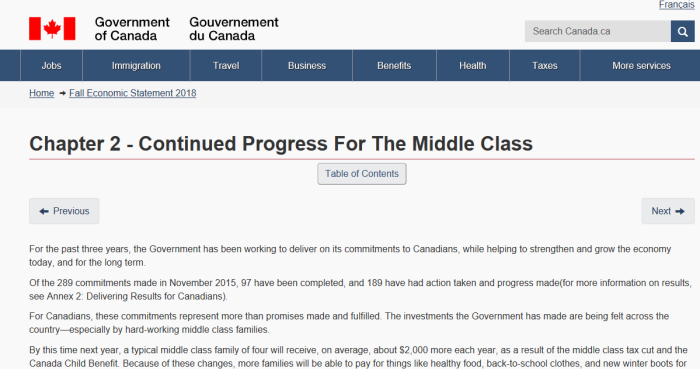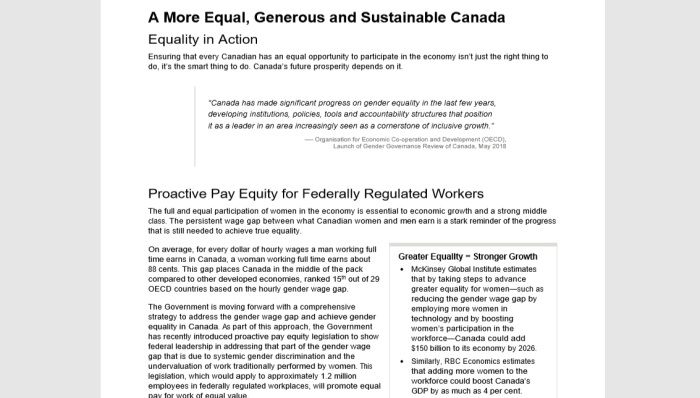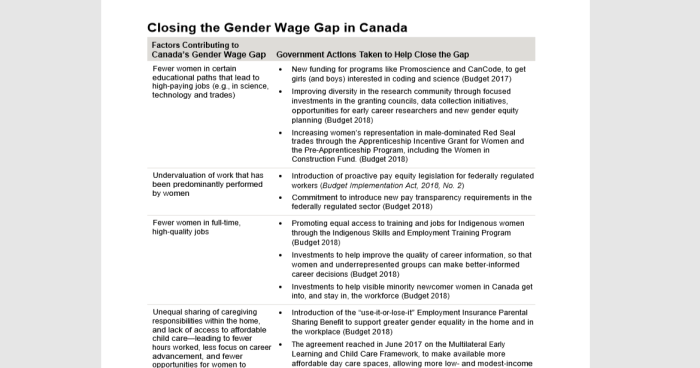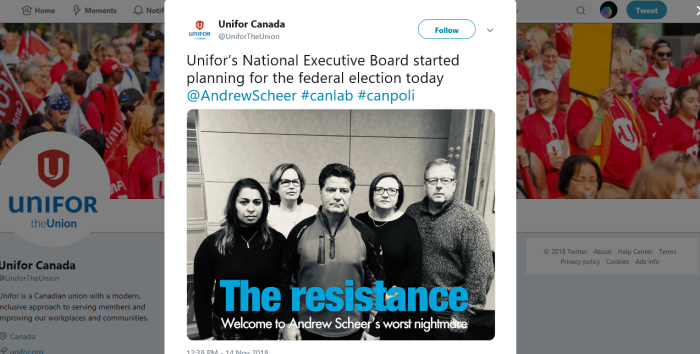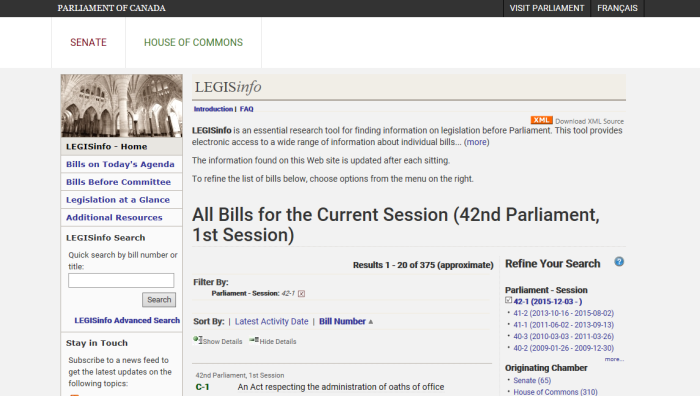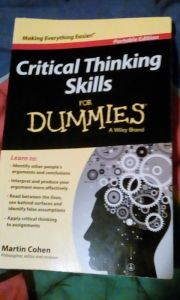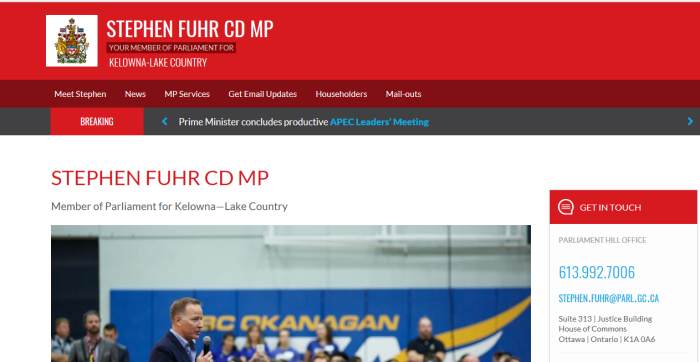(Michelle Rempel video November 21, contradicts October 20 video)
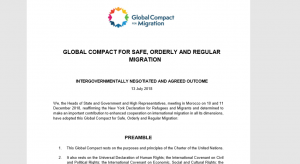
(The U.N. Global Migration Compact)
Summary of Michelle Rempel’s November 21 video:
[0:00 Complaining about Trudeau and New York border jumpers]
[1:00 Finally gets to UN Global migration compact]
[1:23 Clip in House of Commons, complaining about 38,000 border jumpers
[2:00 Trudeau responding]
[2:45 Rempel mentions objective #17, propaganda]
[3:00 Trudeau evading again]
[3:45 Rempel again goes on about 38,000 New York border jumpers]
[4:30 Praise for Harper, taxes, balanced budgets]
[5:10 Rempel again criticises Trudeau’s credibility]
[5:45 Rempel calls Trudeau a bully]
[6:00 Rempel says Trudeau calls names]
[6:15 Rempel says CPC opposes compact because of language (and other reasons)]
[6:30 Rempel says CPC would withdraw and gets its own house in order]
[6:45 Again criticises Trudeau]
[7:08 Rempel says CPC has been consistent, says offering general solutions]
[7:30 Rempel again goes on about refugees being put in hotels]
[8:00 Rempel again says we need a change, and working for Canadians]
YouTuber CanadaPoli released this response video on Rempel’s update, but I believe he was far too kind.
To make this clear: I don’t believe Rempel at all when she says the CPC opposes the UN Global Migration Compact. This seems like going through the motions.
To Rempel’s credit, she does reference the “Propaganda Provisions” embedded in Objective 17 of the UN Global Compact. See here
OBJECTIVE 17: Eliminate all forms of discrimination and promote evidence-based public discourse to shape perceptions of migration
33. We commit to eliminate all forms of discrimination, condemn and counter expressions, acts and manifestations of racism, racial discrimination, violence, xenophobia and related intolerance against all migrants in conformity with international human rights law. We further commit to promote an open and evidence-based public discourse on migration and migrants in partnership with all parts of society, that generates a more realistic, humane and constructive perception in this regard. We also commit to protect freedom of expression in accordance with international law, recognizing that an open and free debate contributes to a comprehensive understanding of all aspects of migration.
Although this is mentioned by Rempel, she still seems rather indifferent towards it in the YouTube video.
However, I believe Rempel is lying in the video when she talks about the CPC opposing this deal with the UN. Here are the reasons (in no particular order)
(1) Rempel Lies About Conservatives Being Consistent
This is probably the easiest to debunk. Here is Rempel’s previous video, starting at 4:50. Rempel talks in circles and doesn’t actually say CPC opposes it.
Further, my own CPC MP confirmed the party was just going to study the Compact, and that Maxime Bernier’s petition was populist grandstanding. There is the article summary.
Here is the audio of that meeting:
(2) Rempel Shows No Urgency In Trying To Stop Compact
If Michelle Rempel actually had any concern over this, she would be a lot more active, and doing a lot more to stop this. Further, she wouldn’t be ignoring emails and phone calls, and blocking people on Twitter
(3) Rempel Spends More Time on Trudeau and Roxham Rd Than Compact
In the 8 minute video above, Rempel goes on and on about Trudeau, about fake refugees being put in hotels, and the achievements of the last government. Very little is actually spent on addressing the UN Compact itself. This is true in many of her videos: talking in circles and repeating herself without ever making a clear point. This is deliberate obfuscation.
(4) CPC Shows No Interest In Promoting Petition E-1906
Surely there are hard feelings over Maxime Bernier leaving the CPC the way he did. But if Conservatives actually opposed this global compact, then they would support this petition, or at least start one of their own.
(5) Rempel’s Video Is Extremely Light On Content
While Rempel did acknowledge the propaganda the UN promotes with regard to language, there is so much more that could be cited, that is simply not. Anyone could make an extemely compelling case against this simply by reading the document?
Serious question: Has Michelle Rempel ever read the UN Global Migration Compact?
Serious question: If these people are “refugees”, then why are we signing the “migration” compact?
Here are the 2 separate agreements.
Again the full document is available here.
OBJECTIVE 1: Collect and utilize accurate and disaggregated data as a basis for evidence based policies
- We commit to strengthen the global evidence base on international migration by improving and investing in the collection, analysis and dissemination of accurate, reliable, comparable data, disaggregated by sex, age, migration status and other characteristics relevant in national contexts, while upholding the right to privacy under international human rights law and protecting personal data. We further commit to ensure this data fosters research, guides coherent and evidence-based policy-making and well-informed public discourse, and allows for effective monitoring and evaluation of the implementation of commitments over time.
This sounds eerily like the StatsCan type mentality, see here, and see here. Privacy is non essential, as long as it is done for statistical purposes.
OBJECTIVE 2: Minimize the adverse drivers and structural factors that compel people to leave their country of origin
- We commit to create conducive political, economic, social and environmental conditions for people to lead peaceful, productive and sustainable lives in their own country and to fulfil their personal aspirations, while ensuring that desperation and deteriorating environments do not compel them to seek a livelihood elsewhere through irregular migration. We further commit to ensure timely and full implementation of the 2030 Agenda for Sustainable Development, as well as to build upon and invest in the implementation of other existing frameworks, in order to enhance the overall impact of the Global Compact to facilitate safe, orderly and regular migration.
This word-salad sounds nice, except when one realises that it goes directly against the purpose of the Global Migration Compact. The U.N. wants to promote mass migration, so spending huge amounts of resources improving conditions in home countries wouldn’t exactly help.
OBJECTIVE 3: Provide accurate and timely information at all stages of migration
- We commit to strengthen our efforts to provide, make available and disseminate accurate, timely, accessible, and transparent information on migration-related aspects for and between States, communities and migrants at all stages of migration. We further commit to use this information to develop migration policies that provide a high degree of predictability and certainty for all actors involved.
This directly contradicts objective #2. Here, the U.N. speaks of coordinating mass movement of people. Indeed, the objective is quite clear: MASS MIGRATION.
OBJECTIVE 4: Ensure that all migrants have proof of legal identity and adequate documentation
- We commit to fulfil the right of all individuals to a legal identity by providing all our nationals with proof of nationality and relevant documentation, allowing national and local authorities to ascertain a migrant’s legal identity upon entry, during stay, and for return, as well as to ensure effective migration procedures, efficient service provision, and improved public safety. We further commit to ensure, through appropriate measures, that migrants are issued adequate documentation and civil registry documents, such as birth, marriage and death certificates, at all stages of migration, as a means to empower migrants to effectively exercise their human rights.
On the surface this sounds great, but think about it. The U.N. is going to obtain identity documents for people. What is to stop people from just claiming they don’t have any documents, and using the U.N. as a proxy to obtain false identification? That is not addressed here.
OBJECTIVE 5: Enhance availability and flexibility of pathways for regular migration
- We commit to adapt options and pathways for regular migration in a manner that facilitates labour mobility and decent work reflecting demographic and labour market realities, optimizes education opportunities, upholds the right to family life, and responds to the needs of migrants in a situation of vulnerability, with a view to expanding and diversifying availability of pathways for safe, orderly and regular migration
What is sounds like. Wanting to streamline mass migration. Do the host countries ever get a say in the matter? Their rights don’t seem important.
OBJECTIVE 6: Facilitate fair and ethical recruitment and safeguard conditions that ensure decent work
- We commit to review existing recruitment mechanisms to guarantee that they are fair and ethical, and to protect all migrant workers against all forms of exploitation and abuse in order to guarantee decent work and maximize the socioeconomic contributions of migrants in both their countries of origin and destination.
No concerns for the unemployment issues that may exist within the host countries. Flood the market with cheap labour. What could go wrong?
OBJECTIVE 7: Address and reduce vulnerabilities in migration
- We commit to respond to the needs of migrants who face situations of vulnerability, which may arise from the circumstances in which they travel or the conditions they face in countries of origin, transit and destination, by assisting them and protecting their human rights, in accordance with our obligations under international law. We further commit to uphold the best interests of the child at all times, as a primary consideration in situations where children are concerned, and to apply a gender-responsive approach in addressing vulnerabilities, including in responses to mixed movements.
The U.N. really does believe that migration is a human right.
OBJECTIVE 8: Save lives and establish coordinated international efforts on missing migrants
- We commit to cooperate internationally to save lives and prevent migrant deaths and injuries through individual or joint search and rescue operations, standardized collection and exchange of relevant information, assuming collective responsibility to preserve the lives of all migrants, in accordance with international law. We further commit to identify those who have died or gone missing, and to facilitate communication with affected families.
This is another objective that sounds great until you realize that this is going on a major operation for search and rescue of migrants who have chosen to flout the will of home countries, and gone missing as a result.
OBJECTIVE 9: Strengthen the transnational response to smuggling of migrants
- We commit to intensify joint efforts to prevent and counter smuggling of migrants by strengthening capacities and international cooperation to prevent, investigate, prosecute and penalize the smuggling of migrants in order to end the impunity of smuggling networks. We further commit to ensure that migrants shall not become liable to criminal prosecution for the fact of having been the object of smuggling, notwithstanding potential prosecution for other violations of national law. We also commit to identify smuggled migrants to protect their human rights, taking into consideration the special needs of women and children, and assisting in particular those migrants subject to smuggling under aggravating circumstances, in accordance with international law
OBJECTIVE 10: Prevent, combat and eradicate trafficking in persons in the context of international migration
- We commit to take legislative or other measures to prevent, combat and eradicate trafficking in persons in the context of international migration by strengthening capacities and international cooperation to investigate, prosecute and penalize trafficking in persons, discouraging demand that fosters exploitation leading to trafficking, and ending impunity of trafficking networks. We further commit to enhance the identification and protection of, and assistance to migrants who have become victims of trafficking, paying particular attention to women and children.
Another 2 objectives that sound great, until you realize that the U.N. is in effect just bringing smuggling under its own control. The actual idea of sneaking people into countries is not going away, rather it is just a change in management.
OBJECTIVE 11: Manage borders in an integrated, secure and coordinated manner
- We commit to manage our national borders in a coordinated manner, promoting bilateral and regional cooperation, ensuring security for States, communities and migrants, and facilitating safe and regular cross-border movements of people while preventing irregular migration. We further commit to implement border management policies that respect national sovereignty, the rule of law, obligations under international law, human rights of all migrants, regardless of their migration status, and are non-discriminatory, gender-responsive and child-sensitive.
Exactly what it appears to be. Countries enforcing their own borders will be a thing of the past. Instead, governments will now coordinate with the U.N. The part about “respecting border sovereignty” is a joke, as the idea of coordinating defeats the idea of sovereignty.
OBJECTIVE 12: Strengthen certainty and predictability in migration procedures for appropriate screening, assessment and referral
- We commit to increase legal certainty and predictability of migration procedures by developing and strengthening effective and human rights-based mechanisms for the adequate and timely screening and individual assessment of all migrants for the purpose of identifying and facilitating access to the appropriate referral procedures, in accordance with international law.
Going through the details, this appears to be a combination of social worker combined with human rights tribunals. Nothing could possibly go wrong?
OBJECTIVE 13: Use immigration detention only as a measure of last resort and work towards alternatives
- We commit to ensure that any detention in the context of international migration follows due process, is non-arbitrary, based on law, necessity, proportionality and individual assessments, is carried out by authorized officials, and for the shortest possible period of time, irrespective of whether detention occurs at the moment of entry, in transit, or proceedings of return, and regardless of the type of place where the detention occurs. We further commit to prioritize noncustodial alternatives to detention that are in line with international law, and to take a human rights-based approach to any detention of migrants, using detention as a measure of last resort only.
Yes, detention of migrants who commit crimes must be a last resort. And you think bleeding heart liberal justice systems are weak now?
OBJECTIVE 14: Enhance consular protection, assistance and cooperation throughout the migration cycle
- We commit to strengthen consular protection of and assistance to our nationals abroad, as well as consular cooperation between States in order to better safeguard the rights and interests of all migrants at all times, and to build upon the functions of consular missions to enhance interactions between migrants and State authorities of countries of origin, transit and destination, in accordance with international law
Here the Compact completely undermines itself. If these people are fleeing horrible persecution, then how exactly do they have “consular services”? Wouldn’t that imply the government does help them?
OBJECTIVE 15: Provide access to basic services for migrants
- We commit to ensure that all migrants, regardless of their migration status, can exercise their human rights through safe access to basic services. We further commit to strengthen migrant inclusive service delivery systems, notwithstanding that nationals and regular migrants may be entitled to more comprehensive service provision, while ensuring that any differential treatment must be based on law, proportionate, pursue a legitimate aim, in accordance with international human rights law.
“Irregulars”, meaning “illegals” are still entitled to most, if not all of the same rights as people “legally” immigrating.
OBJECTIVE 16: Empower migrants and societies to realize full inclusion and social cohesion
- We commit to foster inclusive and cohesive societies by empowering migrants to become active members of society and promoting the reciprocal engagement of receiving communities and migrants in the exercise of their rights and obligations towards each other, including observance of national laws and respect for customs of the country of destination. We further commit to strengthen the welfare of all members of societies by minimizing disparities, avoiding polarization and increasing public confidence in policies and institutions related to migration, in line with the acknowledgment that fully integrated migrants are better positioned to contribute to prosperity.
This may sound great, but in practice it generally means that the host country must bend over backwards to accommodate very different and often incompatible cultures and traditions. Yay, multiculturalism.
*** Object 17 refers to propaganda, which to be fair, Rempel did mention ***
OBJECTIVE 18: Invest in skills development and facilitate mutual recognition of skills, qualifications and competences
- We commit to invest in innovative solutions that facilitate mutual recognition of skills, qualifications and competences of migrant workers at all skills levels, and promote demanddriven skills development to optimize the employability of migrants in formal labour markets in countries of destination and in countries of origin upon return, as well as to ensure decent work in labour migration.
So a job training problem for migrants, one not available to host citizens. Is this not an acknowledgement that we are bringing large numbers of unskilled people? Further, what if the migrants refuse to work? Are we expected to just shut up and pay their welfare?
OBJECTIVE 19: Create conditions for migrants and diasporas to fully contribute to sustainable development in all countries
- We commit to empower migrants and diasporas to catalyse their development contributions, and to harness the benefits of migration as a source of sustainable development, reaffirming that migration is a multidimensional reality of major relevance for the sustainable development of countries of origin, transit and destination
OBJECTIVE 20: Promote faster, safer and cheaper transfer of remittances and foster financial inclusion of migrants
- We commit to promote faster, safer and cheaper remittances by further developing existing conducive policy and regulatory environments that enable competition, regulation and innovation on the remittance market and by providing gender-responsive programmes and instruments that enhance the financial inclusion of migrants and their families. We further commit to optimize the transformative impact of remittances on the well-being of migrant workers and their families, as well as on sustainable development of countries, while respecting that remittances constitute an important source of private capital, and cannot be equated to other international financial flows, such as foreign direct investment, official development assistance, or other public sources of financing for development.
Short explanation: massive open-ended welfare
OBJECTIVE 21: Cooperate in facilitating safe and dignified return and readmission, as well as sustainable reintegration
- We commit to facilitate and cooperate for safe and dignified return and to guarantee due process, individual assessment and effective remedy, by upholding the prohibition of collective expulsion and of returning migrants when there is a real and foreseeable risk of death, torture, and other cruel, inhuman, and degrading treatment or punishment, or other irreparable harm, in accordance with our obligations under international human rights law. We further commit to ensure that our nationals are duly received and readmitted, in full respect for the human right to return to one’s own country and the obligation of States to readmit their own nationals. We also commit to create conducive conditions for personal safety, economic empowerment, inclusion and social cohesion in communities, in order to ensure that reintegration of migrants upon return to their countries of origin is sustainable.
So, we can’t deport someone or send someone back if they claim to be in fear for their lives. That is never abused or used to circumvent legal court orders. “Human rights” in such a way that will undermine public safety.
OBJECTIVE 22: Establish mechanisms for the portability of social security entitlements and earned benefits
- We commit to assist migrant workers at all skills levels to have access to social protection in countries of destination and profit from the portability of applicable social security entitlements and earned benefits in their countries of origin or when they decide to take up work in another country
Not only are we paying welfare, but pensions as well. This although the Canadian government or public has received no benefit. And how would we even verify that this work took place? Ripe for abuse.
OBJECTIVE 23: Strengthen international cooperation and global partnerships for safe, orderly and regular migration
- We commit to support each other in the realization of the objectives and commitments laid out in this Global Compact through enhanced international cooperation, a revitalized global partnership, and in the spirit of solidarity, reaffirming the centrality of a comprehensive and integrated approach to facilitate safe, orderly and regular migration, and recognizing that we are all countries of origin, transit and destination. We further commit to take joint action in addressing the challenges faced by each country to implement this Global Compact, underscoring the specific challenges faced in particular by African countries, least developed countries, landlocked developing countries, small island developing States, and middle-income countries. We also commit to promote the mutually reinforcing nature between the Global Compact and existing international legal and policy frameworks, by aligning the implementation of this Global Compact with such frameworks, particularly the 2030 Agenda for Sustainable Development as well as the Addis Ababa Action Agenda, and their recognition that migration and sustainable development are multidimensional and interdependent
Earlier, we are told that each country will maintain sovereignty. Now, its “global partnerships”.
Once more, the entire document is available here.
And here are the 2 separate agreements, one for migrants, one for refugees.
Back to the original point: CPC “Immigration Shadow Minister” Michelle Rempel now claims the CPC opposes the UN Global Migration Compact in her YouTube video. This is stark contrast to when she shrugged it off as “non-binding”.
However, in the video, she spends most of the time talking about other things. There is no sense of urgency, and the video is very lacking in details. Here are just the 23 OBJECTIVES, and they are scary.
Has Michelle Rempel even read the U.N. Global Migration Compact?
Doubtful, otherwise her video wouldn’t meander nearly as much. Either that or she is flat out lying.




